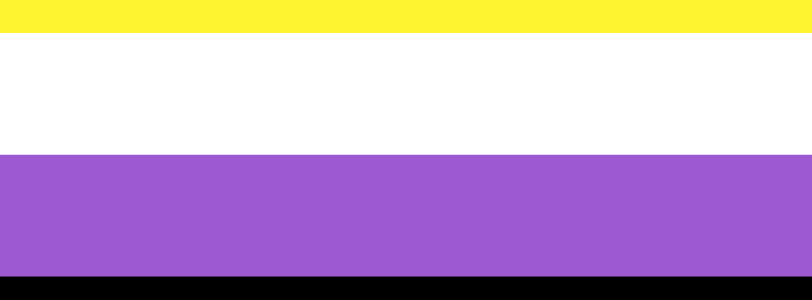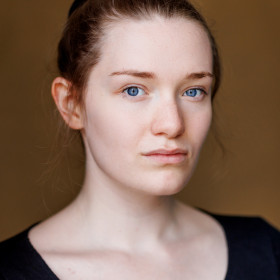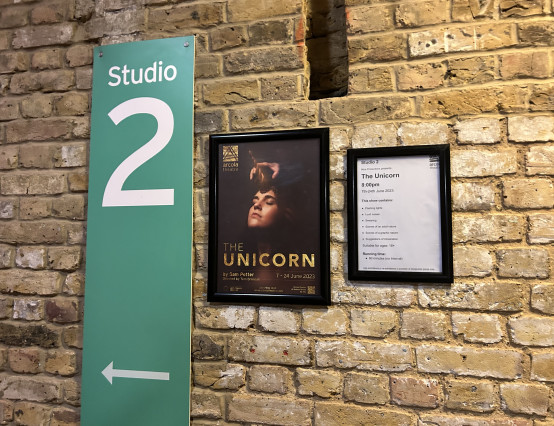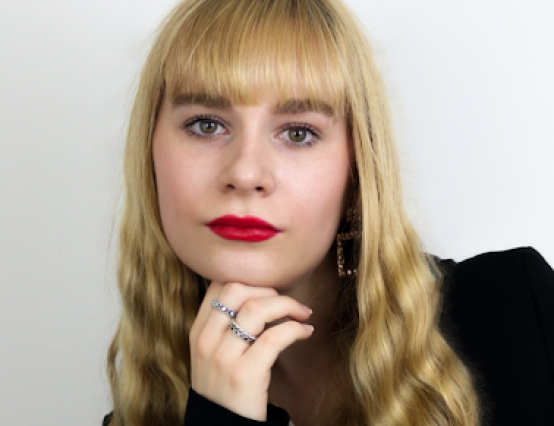Non-binary people have always existed throughout recorded history despite the ignorance of those who refuse to recognise or champion those who identify as such. But only recently have we started to see true representation across the genres of theatre, film and TV and literature. When I talk about non-binary, I refer to the general label given to anyone of a non-cisgender identity. I personally have she/they pronouns but no specific label, but non-binary has been a label that has been most common within the global consciousness.
Celebrities that have expressed with non-binary or gender non-conforming identities include Cara Delevingne (Carnival Row), Indya Moore (Pose), Brigette Lundy-Paine (Atypical), Lachlan Watson (Chilling Adventures of Sabrina) and Amandla Stenberg (The Eddy). All of these actors have openly talked about their identities and really show that we are here to stay. There are many different labels individuals use to describe (or not) themselves: agender, genderqueer, genderfluid, gender non-conforming, or any other gender identity outside the traditional male/female binary. Their voices make sure that the media is a more inclusive place and encourages respect and understanding from cis-gender individuals.
TV
TV and streaming services have shown a huge leap forward in representation. The reboot of the Australian TV show Heartbreak High was one of the best written TV shows with non-binary characters who were portrayed as having messy romantic relationships and wonderful friendships, just like anyone else, with gender not being a huge issue or discussion point. Quoting Teen Vogue’s Valentina Valentini, as said in The Collider,
‘From Steven Universe to She-Ra and the Princesses of Power to Good Omens, The Good Place, Younger, Vida, and most recently Zoey's Extraordinary Playlist, television is helping bring visibility to those who identify outside of the male/female gender binary by giving characters a place, voice, and fleshed-out arc with more traits than just their gender identity to help them tell their story. This is what we desperately need in movies.’
Film
When talking about representation in film, we have to talk about the offensive characters played often by cis-gender actors, but also the fact they are played for laughs. Mrs Doubtfire is a clear example, especially now it has been turned into a musical. There has been uproar in the trans+ community about this film in a modern day context and why it is flawed. It is a hugely iconic film but it must be understood that the audience is geared to find Williams’ transformation into Mrs Doubtfire as comical and an ‘act’. For someone to go through a transition, it is a huge, monumental process for someone to undertake and the fact the difficulty of transitioning is disregarded and made into a joke, is deeply problematic and disrespectful to this community. Other poor depictions of gender non-conforming roles in film include cis actors Benedict Cumberbatch as All from Zoolander 2, where All’s identity is played for laughs and disrespected with invasive questions, and Eddie Redmayne as Lili Ebe, one of the first people to undergo a sex-change operation.
There have also been wonderful non-binary actors. Asia Kate Dillon as The Adjudicator in John Wick: Chapter 3 - Parabellum, who requested their character be non-binary without questions about pronouns or characters having issues with them. Kai Bradley as Jaime in Upgrade is another one, who actually says they do not have a gender.
Theatre
In theatre, there have been huge leaps forward for representation of non-binary identifying genders on stage, however, the industry is still incredibly gendered. The language and terminology for voice parts is being heavily rethought as ‘men’ are now required to sing higher and ‘female’ voices require a higher range but also much lower than historically they have been. There are many productions who have embraced gender diversity - I, Joan based on the Joan of Arc life story, at The Globe. This play changed pronouns for Joan from she/her to they/them, reflecting the actor they’ve cast.
A musical theatre example from the UK is &Juliet. The character of May originally played by Arun Blair-Mangat, often is played by a male presenting actor and the role is gender non-conforming. They wear corsets and have one of the most moving songs in the show, Britney Spears’ “I’m Not a Girl, Not Yet a Woman.” Throughout, May is not defined by any gender perception and has a relationship with a man in the show. Their duet is Katy Perry’s “I Kissed a Girl.” The role has been played by a few non-binary performers and has an arc just like the cis-gender roles. As the original Juliet Miriam Teak-Lee said,
“Shakespeare never really paid any attention to gender…we’re introducing this character where we’re not confining them to any bracket of gender…Nobody needs to ask any questions about it and everybody’s OK with it, and that’s a beautiful thing. [I love] that we’re going in that direction.”
There is also Pythio in Head over Heels, a musical I know little about personally but, who in the original 2018 production was non-binary and pronouns were recognised and respected.
A perhaps less well-created role is Jo from Jagged Little Pill, a musical featuring the music of Alanis Morissette. The role itself in its early iterations was explicitly non-binary: the character used they/them pronouns, fought with their mother about gender, were deadnamed, and they were invalidated by their girlfriend. The musical heavily coded the character without ever saying the words non-binary but it was very clear to the Boston audience and critics that the character was gender fluid. As the producers had cast a cis actor, Lauren Patten, to play the role and wanted to keep her for the Broadway transfer, they removed these interactions reducing them to a comment about clothing and gender presentation. Deadnaming is still part of the arc for Jo. Gender identity was removed from the list of themes dealt in the show. The controversy surrounding this show is how the book writers, director and Patton herself denied that Jo was ever non-binary. The show had the chance to uplift trans+ and non-binary voices and decided against it, which is erasure.
What is even more difficult is that Patten’s understudy, Iris Menas (zie/hir), is non-binary. In an interview Iris said the role “is so closely related to my own experience” and that “there’s not a whole lot of separation between me and this character.” Iris embraces the original, non-binary version of the character.
Another reason why the show may have wanted to re-write Jo as a cis character is for Tony Awards. The publicity helps box office sales and exposure of the show around the world, hence why some shows heavily rely on this. Award categories are heavily gendered. This is a bigger problem at bay - Broadway (and the West End) do not seem to care about non-binary performers and their faithful representation on stage. The show can easily be fixed, but it relies on creative ‘risks’ and honouring the part it once was and the community that felt represented by this role - finally.
Christian Lewis said,
‘Instead of joining the transphobic ranks of Tootsie and the upcoming Mrs. Doubtfire and Some Like It Hot, Jagged Little Pill has the chance to stand beside Head Over Heels’.
There is work being produced that laughs at or makes fun of characters for their gender expression such as the aforementioned shows. There is more of this writing than authentic representation and that needs to change.
What completely fulfilled this assignment was the Regents’ Park Open Air Theatre in London and their production of Legally Blonde. This show featured non-binary performers, trans performers and plus-size performers, making it one of the most wonderfully inclusive shows ever seen on the stage. It is originally such a gendered show, so it’s clear that barriers can be broken and stories still told with different voices.
Literature
Literature has displayed a huge array of wonderful writing of non-binary characters, albeit predominantly over the last decade.
Perpich details a huge variety of trans and non-binary characters that feature in a wide range of novels. I wanted to highlight three I think were brilliant and definitely ones to watch for.
She who Became the Sun
Set in the 14th Century, this novel tells the story of Zhu Yuanzhang, a young girl who became a monk and eventually a rebel leader before becoming Emperor. It is based on true events but a genderqueer retelling. She takes the name Zhu Chongba after her brother, disguises herself as a man and rises through the ranks of the rebel army against China’s occupiers, the Mongols. Zhu Chongba starts the novel as their gender assigned from birth (female) but finds themselves as both and neither. They are a strong example of non-binary representation.
Nettleback
Nettleback is the first novel from British non-binary writer Nat Reeve. It has many literary influences such as Shakespeare, Agatha Christie and Charles Dickens. It is written in the form of letters and set in the late 19th century telling the story of Henry Nettleblack, the youngest daughter of a family who developed a medicinal tincture. When Henry’s eldest sister wishes to marry her off, she flies and finds the local vigilante group the Dallyangle division where she meets Pip Property, a non-binary character. They discourse about pronouns.
Loveless
Loveless by queer cis author Alice Oseman (creator of Heartstopper). ‘Loveless’ features a huge variety of LGBTQ characters including Sunil a non-binary asexual character. The TV show was also a smash hit on Netflix, once again proving that queer content is in high demand and is critically successful and hits with audiences.
As can be seen across the areas discussed, there is a wonderful collection of characters being added to the mainstream canon of non-binary actors and characters taking the spotlight. A huge amount of problematic and preventable behaviour also casts a shadow over this progress but, there is only more to push for in terms of accurate and authentic representation, as well as the rights of non-cis actors, authors and creatives in the industry.









0 Comments